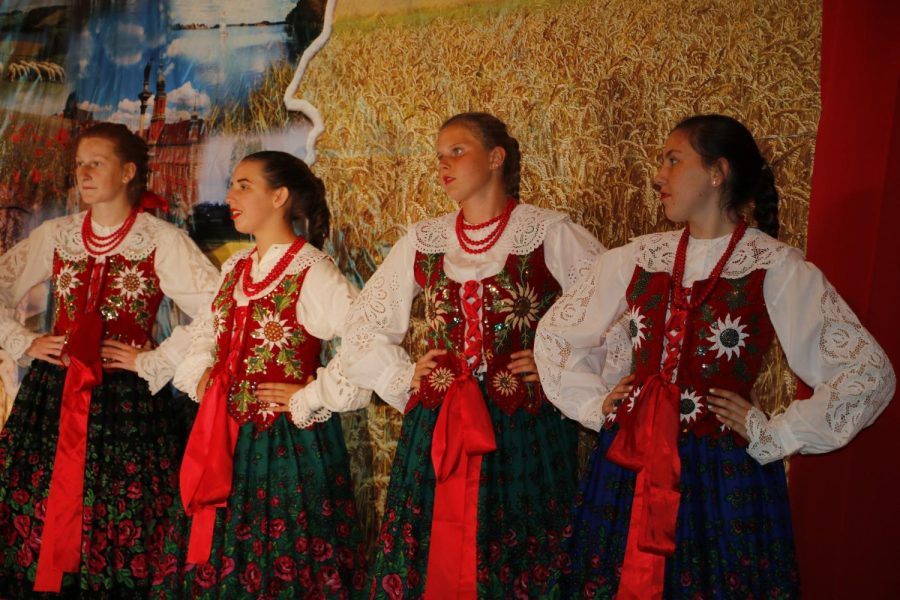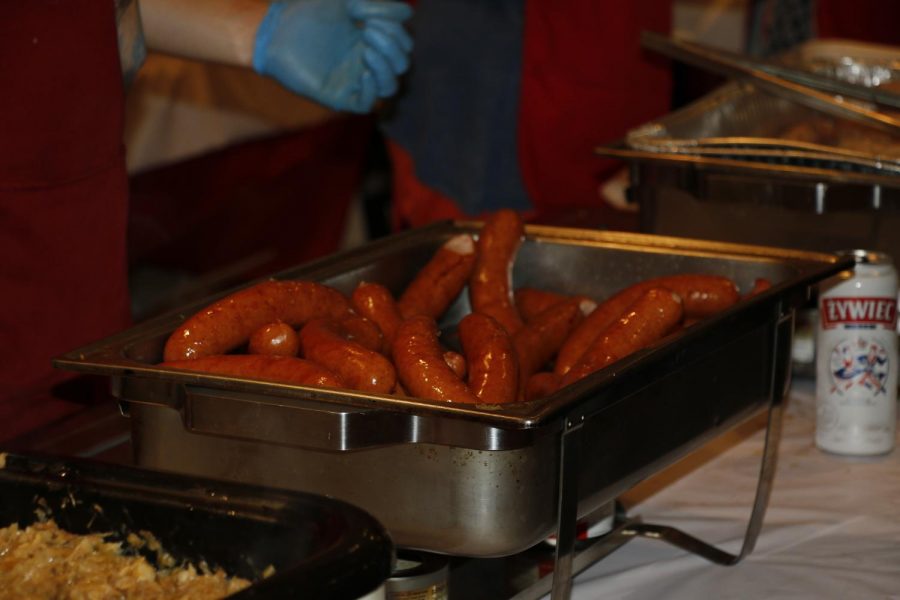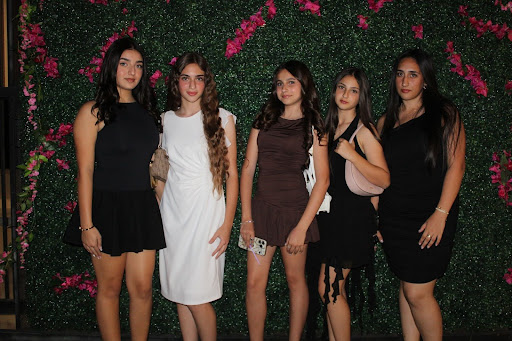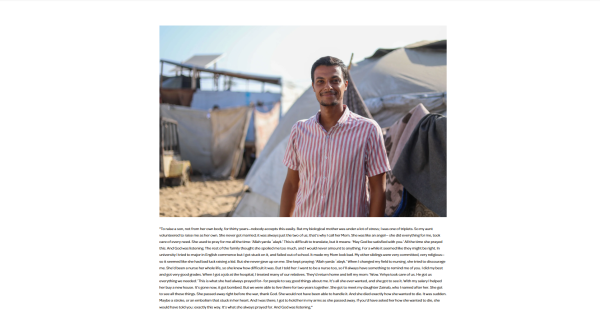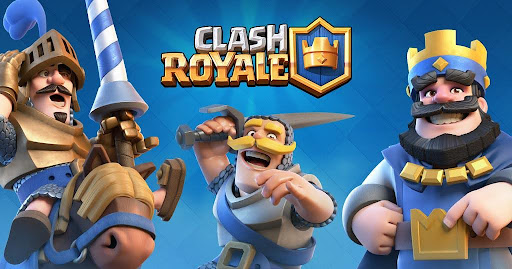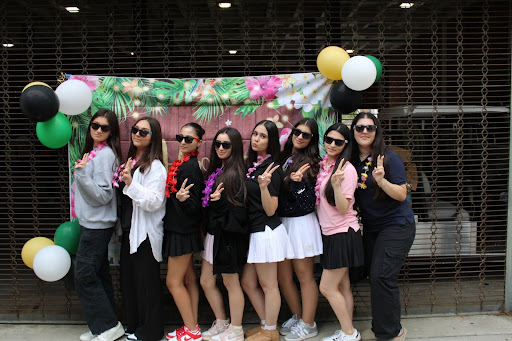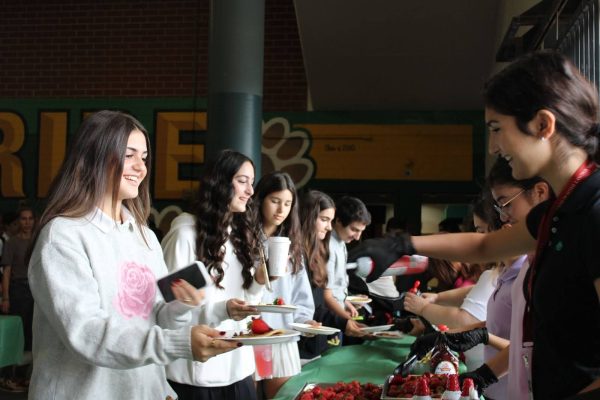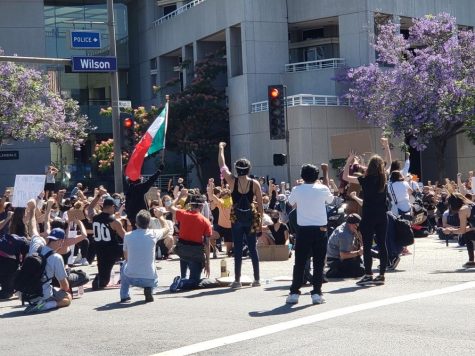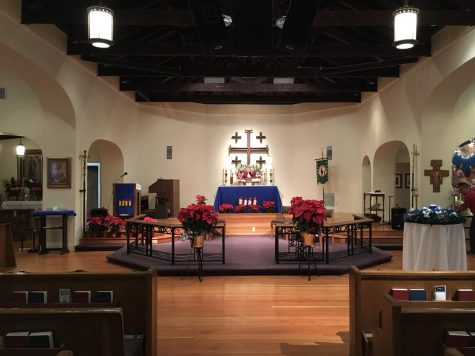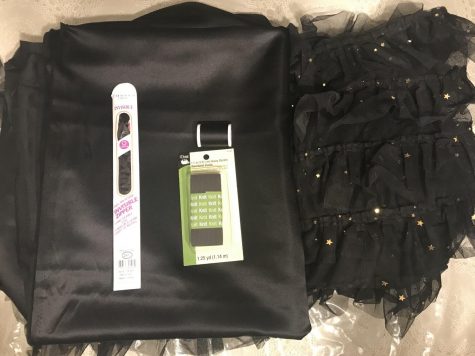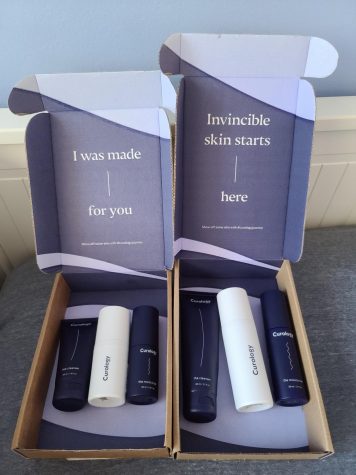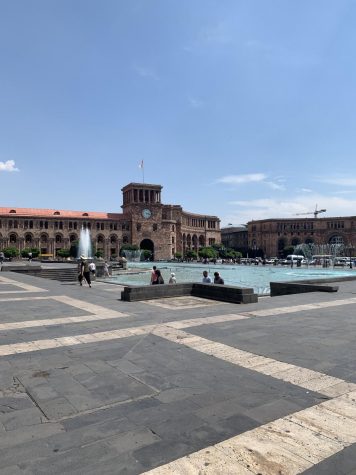Embracing Polish culture
Local Polish-Americans participate in the 39th Polish Harvest Festival in Yorba Linda
“Krakusy” performs the highlander dance.
“I think it is very important that we celebrate our culture and uphold multiple traditions because if we don’t preserve it then no one will. It’s up to us to continue them,” said La Cañada High School junior Aleksandra Dudek, an annual participant of the Polish Harvest Festival in Yorba Linda.
Astounded by the sweeping crowds wandering the bustling parking lot, Dudek explains, “This has always been a tradition in my family and we participate every year because we love to embrace our Polish culture.”
The second I strode past the waving banner into the jam-packed parking lot, I was enveloped with the exact Polish pride Dudek had mentioned, instantly struck with the overwhelming yet delectable scent of Polish cuisine. Among the myriad of folk decorations was an array of carnival booths encompassing every aspect of a cultural festivity including an assemblage of Polish merchandise, informational history displays, and an assortment of varied entertainment luring the enraptured crowds closer to the stage as lively music played in the background. As I ambled towards the illuminated dais, a bustling troupe of young performers dressed in distinctive, festive costumes prepared to perform as the host annunciated the opening of this year’s 39th Polish Harvest Festival in Yorba Linda.
These harvest festivals originated in Central and Eastern Europe, and were held by peasants and farmers to celebrate a successful season in the fields around the sixteenth century. The celebratory processions included an intertwined wreath compiled from sheaths of grain, native field flowers and streaming ribbons symbolic of traditional thanksgiving after an ample harvest. Dates of the festivities varied, either beginning the day of the Autumn Equinox or on the Feast of the Assumption of Mary where the decorated wreaths were blessed by a priest in Catholic villages.
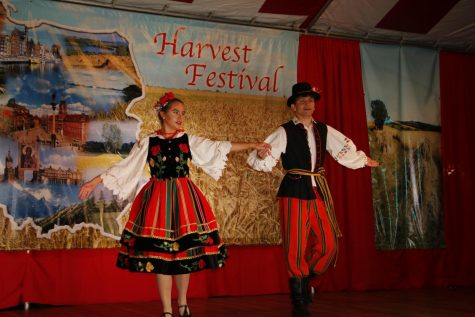
A duo showcasing the lively spins of “Strach”.
Throughout the years, the tradition persisted, and upon the commencement of this year’s festival, decorated, round and rectangular wreaths were carried from the church to the stage honoring the harvest procession. Amid the procession were folk dancers clutching straw baskets containing traditional baked bread, ripe autumn fruits and bright, blossoming flowers ranging from the bold, yellow of sunflowers to the eye-catching crimson color of wild poppies.
Among the dancers were highlander musicians, fiddling and rendering traditional melodies which echoed throughout the mass of guests. With keen awareness, I watched each dancer position their overflowing basket atop the stage, facing the captivated onlookers. With the procession at its close, the long-awaited festivities commenced.
Apart from anything else, I was ready to indulge myself in the diverse, selection of authentic Polish food, capturing countless of appetites upon arrival seeing the already, prolonged line of hungry guests encircling the packed booths.
“My favorite part about these festivals is the Polish food, which is very different, especially because most of it is handmade and hard to come by on a daily basis,” Dudek said while standing in line for a classic dish of pierogi — Polish, boiled dumplings.
“Although pierogi can have many various fillings such as sauerkraut, meat, sweet cheese or fruits, my favorite have always been the potato and cheese filled ones,” Dudek said as she was handed a steaming plate of pierogi topped with crispy bacon and fried onion drizzled with melted butter.
Apart from the pierogi, considered one of Poland’s national dishes, volunteers prepared savory dishes of gołąbki, boiled cabbage rolls filled with minced meat and rice poured over with creamy, tomato sauce; kiełbasa, grilled, polish sausage; placki ziemniaczane, tasty potato pancakes served with applesauce; and my personal favorite, naleśniki, a Polish blintz filled with sweet, farmer’s cheese doused with powdered sugar.
“One of my favorite parts about being Polish is being able to cook the traditional dishes,” said North Torrance High School junior Caroline Martin, a dancer at this year’s festival. “I learned all the different recipes from my grandma and they taste amazing.”
Nevertheless, traditional dishes also encompass classic pastries and cakes including the widely-popularized pączki — fluffy, Polish doughnuts filled with delicious, plum jam and coated with glaze with occasional dried chunks of orange zests — the perfect finish to your Polish meal.
Now satiated, I advanced towards the enlightened stage eager to find a seat within a visible range of the stage, impatient to see the dancers sprightly performances. The performances flowed from one region of Poland to the other as various dance groups and plays obtained the spotlight one after another. “Tatry,” a folk dancing group based in Phoenix, astounded the audience with their unique performance of the Polish highlander dance, complete with their own talented musicians who played the music live next to the dancers. Other groups included “Piast” from Las Vegas, who performed an impressive krakowiak — Kraków’s regional dance — and Yorba Linda’s personal dance group named “Polanie.”
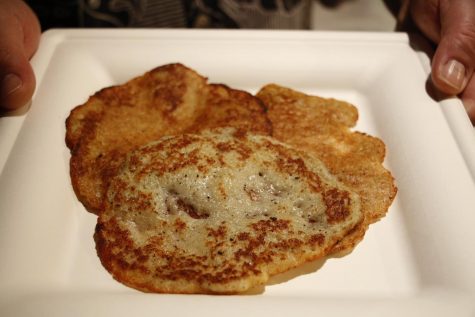
A plate of placki ziemniaczane, plain potato pancakes
“When I was small, I always went to all these festivals and I got to know these great people who really motivated me to dance and perform,” Martin said before going up on stage to perform one of Chopin’s renowned waltzes. “These groups teach things you can’t learn through a textbook and they really bring you closer together.”
After their enchanting Waltz, Martin and her friends — members of a Polish folk dance ensemble named “Krakusy” situated in Los Angeles — hurried backstage to prepare for the next number, an extraordinary highlander dance and Wianki, an ancient ritual of young women throwing wild flower crowns into ponds awaiting a young suitor to swim and claim their crown on a festivity named “sobótki.”
For obvious reasons, the young dancers did not toss their elegantly-decorated crowns into water but still produced a sensational effect, and their unparalleled performance received thundering applause.
“Performing these dances for others is important because it helps to give them a taste of the culture that they may have never experienced before or heard of especially, if they are visiting with friends or family and may not be Polish,” Dudek said.
“When I see people absorbing our culture and enjoying what we do, it just puts a smile on my face,” said Crescenta Valley High School freshman Victoria Borkowski after performing her last dance of the day.
After the performances, humorous adaptation of Rzepka — a traditional children’s rhyming story written by Julian Tuwim — and poetical recitations by the students of the Polish Saturday School in Yorba Linda, I explored the remaining activities including the children’s game zone which was suffused with culture-induced games such as this adaptation of ring toss transformed into throwing a “góralski kapelusz” or typical, highlander hat at three “peaks” named Trzy Korony, Śnieżka and Rysy each higher than the other, your goal being to hook the hat on one of the peaks. Each win would earn kids tokens which could be traded in for prizes such as Poland magnets, “walking” pet balloons or stuffed animals each received with an immense smile on the childrens’ faces.
“I love coming to Polish festivals because of the ability to spend time with friends in a really festive atmosphere celebrating our Polish roots that we all love and embracing the Polish culture despite the fact that I live in a different country,” Dudek said. “I hope to one day take my kids to these festivals and enroll them into Polish School and Polish scouting and incorporate these long-lasting traditions into their lifestyle.”
“I would want my kids to pass down our culture and understand the country’s language, geography and history because it’s what brings us together and it’s what people carry out from this experience, too,” Martin said.
As the last stream of sunlight drifted away from the ever-growing darkness of the evening, light bulbs glistened along the booths and the engulfed guests, eager to buy leftovers of the appetizing dishes. Resounding disco music and booming laughs resonated from the dining tents as the 39th Polish Harvest Festival in Yorba Linda came to a conclusion.
“Being Polish-American means a lot to me, and it gives me pride because people know my culture and language and when they get excited about it it just makes me so happy to know I’m doing my part in keeping our heritage alive,” Martin said.
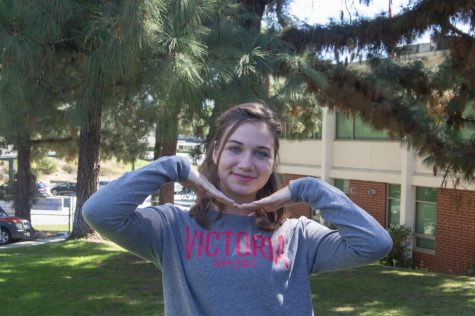
Hobbies: Reading mystery novels and traveling
Favorite shows: Find me the time to watch shows and I'll tell you
Places you want to travel to: Dubrovnik,...



